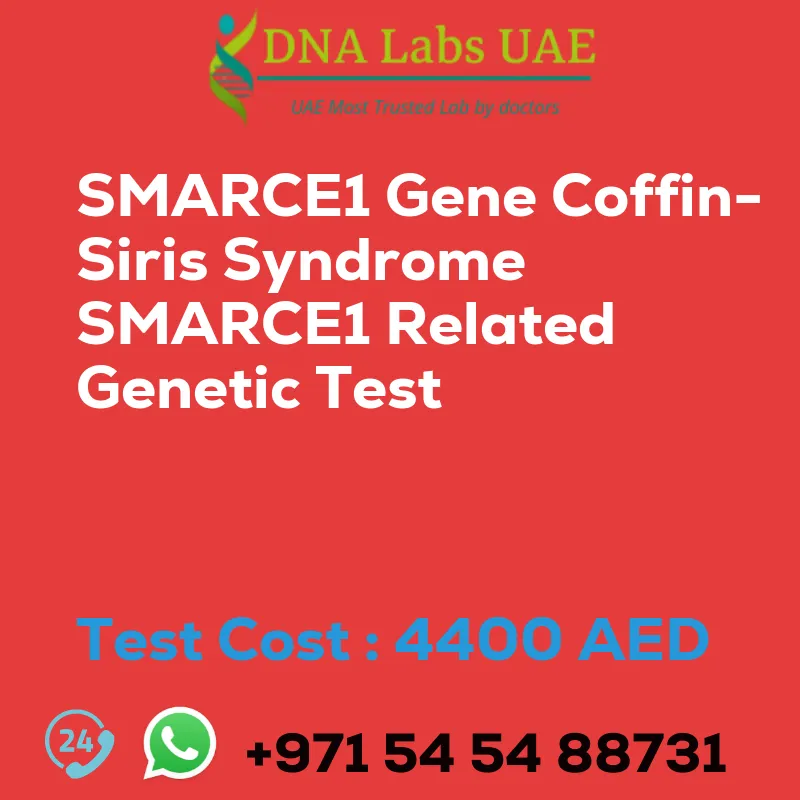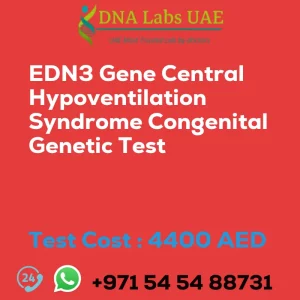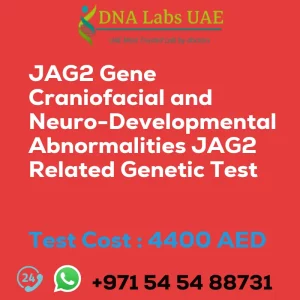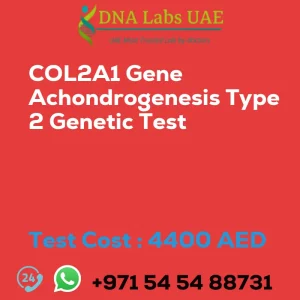SMARCE1 Gene Coffin-Siris Syndrome Genetic Test
The SMARCE1 gene is associated with Coffin-Siris syndrome, a rare genetic disorder characterized by intellectual disability, developmental delays, distinctive facial features, and other physical abnormalities. To diagnose this syndrome, DNA Labs UAE offers the SMARCE1 Gene Coffin-Siris Syndrome SMARCE1 related Genetic Test.
Test Components and Price
The cost of the SMARCE1 Gene Coffin-Siris Syndrome SMARCE1 related Genetic Test is AED 4400.0. The test requires a blood sample, extracted DNA, or one drop of blood on an FTA card.
Report Delivery and Method
The report for the SMARCE1 Gene Coffin-Siris Syndrome SMARCE1 related Genetic Test will be delivered within 3 to 4 weeks. The test is performed using NGS (Next-Generation Sequencing) technology.
Test Type and Doctor
The SMARCE1 Gene Coffin-Siris Syndrome SMARCE1 related Genetic Test falls under the category of Dysmorphology. It is recommended to consult with a pediatrician for this test.
Test Department and Pre Test Information
The test is conducted in the Genetics department. Prior to the test, it is important to provide the clinical history of the patient who is going for the SMARCE1 Gene Coffin-Siris Syndrome SMARCE1 related NGS Genetic DNA Test. A genetic counseling session will also be conducted to draw a pedigree chart of family members affected with Coffin-Siris syndrome.
Test Details
NGS (Next-Generation Sequencing) genetic testing is used to analyze the SMARCE1 gene for mutations or variations that may be causing Coffin-Siris syndrome. This technology allows for the simultaneous sequencing of multiple genes, providing a more comprehensive analysis compared to traditional Sanger sequencing methods.
The SMARCE1 related NGS genetic test involves obtaining a DNA sample, typically through a blood sample or saliva swab, from the individual being tested. The DNA is then sequenced using NGS technology to identify any genetic variations or mutations in the SMARCE1 gene.
The results of the SMARCE1 related NGS genetic test can help confirm a diagnosis of Coffin-Siris syndrome and provide information about the specific genetic variant or mutation present. This information can be useful for genetic counseling, family planning, and potentially guiding treatment options or management strategies for individuals with Coffin-Siris syndrome.
| Test Name | SMARCE1 Gene Coffin-Siris syndrome SMARCE1 related Genetic Test |
|---|---|
| Components | |
| Price | 4400.0 AED |
| Sample Condition | Blood or Extracted DNA or One drop Blood on FTA Card |
| Report Delivery | 3 to 4 Weeks |
| Method | NGS Technology |
| Test type | Dysmorphology |
| Doctor | Pediatrics |
| Test Department: | Genetics |
| Pre Test Information | Clinical History of Patient who is going for SMARCE1 Gene Coffin-Siris syndrome, SMARCE1 related NGS Genetic DNA Test. A Genetic Counselling session to draw a pedigree chart of family members affected with SMARCE1 Gene Coffin-Siris syndrome, SMARCE1 related NGS Genetic DNA Test gene SMARCE1 |
| Test Details |
The SMARCE1 gene is associated with Coffin-Siris syndrome, a rare genetic disorder characterized by intellectual disability, developmental delays, distinctive facial features, and other physical abnormalities. NGS (Next-Generation Sequencing) genetic testing can be used to analyze the SMARCE1 gene for mutations or variations that may be causing Coffin-Siris syndrome. NGS technology allows for the simultaneous sequencing of multiple genes, providing a more comprehensive analysis compared to traditional Sanger sequencing methods. The SMARCE1 related NGS genetic test involves obtaining a DNA sample, typically through a blood sample or saliva swab, from the individual being tested. The DNA is then sequenced using NGS technology to identify any genetic variations or mutations in the SMARCE1 gene. The results of the SMARCE1 related NGS genetic test can help confirm a diagnosis of Coffin-Siris syndrome and provide information about the specific genetic variant or mutation present. This information can be useful for genetic counseling, family planning, and potentially guiding treatment options or management strategies for individuals with Coffin-Siris syndrome. |








